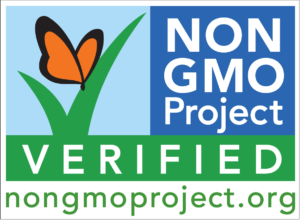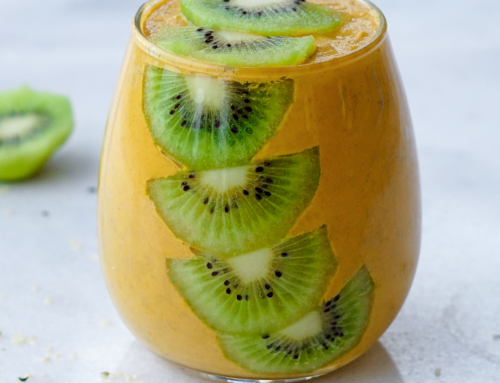You might have heard me talking about how I go by the 80/20 rule. The idea is eating clean at least 80% of the time, but not obsessing over every single thing you eat when you’re dining out with friends or traveling. There is a fine line between living healthfully and developing an eating disorder known as orthorexia, which we don’t want to cross 😉
Now that being said, there are some “foods” that I won’t touch with a 10-foot stick, even when I am splurging! Here’s an overview of what they are and how to replace them with healthier options.
1. GMOs (GENETICALLY MODIFIED ORGANISMS): Not only can GMOs lead to the production of new allergens, antibiotic resistance, increased toxicity and further negative impacts on human health, but they can also damage the environment (increased pesticide and herbicide use, monocultures, etc.), decrease crop yields and crop variety, lead to loss of land for communities (focus on commodity crops) and hurt organic farmers through patent infringements. Moreover, the high prices of GMO seeds, exponential increase in required pesticides and drastically reduced yields have put lots of BT farmers in debt or right above, causing tragedies such as the farmers’ suicide epidemic in India! Unfortunately, currently, only 64 countries around the world (such as 28 nations in the European Union, Japan, Australia, Brazil, Russia and China) require labeling of genetically modified foods.
So when it comes to common GMO crops such as soy, corn, cotton, canola, sugar beets and alfalfa, it is best to opt for organic varieties or select products with the “Non-GMO Project Verified” seal.

2. SODA & DIET SODA: Soda has no nutritional value whatsoever and is loaded with sugar or high-fructose corn syrup (often 10 teaspoons per can), as well as sodium and caffeine, which dehydrate the body and cause a spike in blood sugar. Therefore, regular consumption can instigate insulin resistance, diabetes, weight gain and obesity. Moreover, the phosphoric acid in colas prevents proper calcium absorption and could lead to osteoporosis and cavities.
Diet soda contains aspartame instead of sugar, an artificial sweetener, which is even more harmful than sugar! Aspartame can damage neurons and lead to a wide variety of illnesses such as MS, brain tumors, diabetes, epilepsy, Alzheimer’s and adverse reactions causing seizures and even death (more info on artificial sweeteners here)! Diet soda also increases sugar cravings and often leads to higher caloric intake throughout the day.
A great alternative to soda or diet soda is kombucha, a fizzy fruity probiotic drink that helps populate the good bacteria in the gut. Another option is drinking (carbonated) water with a squeeze of lemon juice, fruits like berries and fresh mint.
3. NON-DAIRY CREAMERS: Advertised as a “healthy”, low-calorie and low-fat alternative to cream, these non-dairy creamers are unfortunately loaded with fake ingredients such as partially hydrogenated oils, high-fructose corn syrup, artificial sweeteners, additives and “natural” flavors (aka MSG), which can increase the risk of diabetes, heart disease, and cancer.
Steer clear of these “non-food” products and use full-fat coconut milk, almond milk, hemp milk or other non-dairy milk of choice instead. I highly recommend making your own non-dairy milk, which takes less than 10 minutes (check out this super simple and delicious almond milk recipe); or if you’re buying it from a store, make sure to read the ingredients list and opt for brands with the least amount of additives.
4. CEREAL: Not only are they high in refined sugar most of the time, but also all cereals (even the organic ones!) are made by extrusion, a process by which ingredients go through high heat and pressure to get the desired shapes and forms. Extrusion destroys the synthetic vitamins that are added to the cereals and also denatures the fatty acids and amino acids turning them into neurotoxins!
I would recommend replacing cereal with homemade granola made out of oats, nuts, seeds and raw honey or pure maple syrup (check out my nutritious raw & soaked granola recipe here). You could also enjoy overnight oats – or even better, fermented oatmeal -or buckwheat smoothies for breakfast instead of cereal.
5. FROZEN DINNERS: Frozen dinners are often high in sodium and contain sugar, hydrogenated oils, additives, artificial flavors, and preservatives, resulting in very poor nutritional value, if any.
Nothing beats home-cooked meals using real whole food ingredients, of course. If you are short on time, I recommend planning your meals ahead of time, doing all the grocery shopping, cleaning, and prep work over the weekend. Another helpful suggestion is cooking in large batches when you have some free time, packing individual portions in airtight containers or jars and storing them in the freezer to use throughout the week or month. If you’d like to have a tried and true meal plan with over 30 healthy and delicious recipes, grocery shopping list and guide, plus lots of meal prep tips and tricks, check out the Happy Bites Meal Plan here.
6. KETCHUP: Most bottled ketchups consist of overcooked tomatoes, a large amount of sugar, usually in the form of high-fructose corn syrup (most likely made out of GMO corn), and “natural” flavors (aka MSG). Ketchup typically contains 4 grams of sugar per tablespoon, but people often consume much more than one tablespoon at a time, which quickly builds up your daily sugar load.
You can easily make your own homemade ketchup (here is one of my favorite recipes) or use salsa or hot sauce instead.
7. PACKAGED FRUIT JUICE: I’m talking Tropicana or other brands of fruit juice, not the cold-pressed bottled ones that have recently become more popular (thankfully). Even when made out of real fruits and with no added sugar, these juices are still high in sugar, low in fiber and void of many nutrients found in the original fruits, due to being heavily processed and pasteurized. They also often contain artificial flavorings and preservatives that could lead to allergies in many people.
Go for fresh whole fruits instead, or have cold-pressed juices containing several vegetables as well as fruits. Adding vegetables such as celery, kale, spinach or mint and low-sugar fruits like cucumbers could significantly reduce the sugar content, bump up the nutritional value and add a delightful vibrant twist!
8. PROCESSED LUNCH MEATS: Processed lunch meats such as sausage, hot dog and pepperoni are made out of the fatty leftovers and trimmings of poor quality cuts of meats. They are highly processed and contain high levels of fat, sodium, corn syrup (most likely from GMO corn), nitrates, additives and artificial flavors.
I would suggest opting for organic grass-fed beef or jerky or lunch meats prepared by your local butcher using high quality organic, grass-fed cuts.
Do you agree with this list? What are some of the foods you wouldn’t eat? Let me know in the comments below.







Leave A Comment